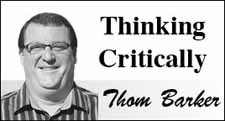It has become fairly rare to see movies from the 1950s presented on TV, unless you subscribe to one of those "classic" movie channels.
This weekend, though, I managed to catch Rebel Without a Cause, largely acclaimed as the quintessential suburban teen angst movie. I had not seen this film in many years. In fact, I'm pretty sure it was when I was still in the throes of my own suburban teen angst.
This was even before VCRs were widely available, when, if you wanted to see the classics you had to skip school and go to one of the highly fashionable, and eminently grungy, repertory theatres.
All in all, it's a pretty good flick that stands the test of time with a decent script and some great performances led by James Dean's stellar portrayal of Jim Stark, the disenfranchised bad boy based loosely on the subject, a boy named Harold, of Robert Lindner's, 1944 book Rebel Without A Cause: The Hypnoanalysis of a Criminal Psychopath based on the author's Freudian analysis of what we then called a juvenile delinquent.
I'm not entirely sure the film would enjoy its iconic status had it not been for the fact Dean died in a spectacular car crash just a month before Warner Brothers released Rebel, but I found it fascinating as viewed through the lens of adulthood, particularly how it illuminated the sensibilities of the time.
In particular, the backstory that emerges seems to indicate that Jim's rebelliousness stems from some gender-role confusion because of his father's acquiescence a his domineering mother and wife.
At one point, he even laments to the police captain, "I mean if he had the guts to knock Mom cold once, I bet she'd be happy and I bet she'd stop picking. They make mush out of him. Just mush. One thing I know is I never want to be like him."
Harold, the juvenile delinquent, like Jim, was the product of a "dysfunctional family," which in the parlance of the day, I gather meant one in which the woman "wore the pants," so to speak.
Of course, Lindner, an early 20th century psychologist was also a product of his time.
In a review of Rebel Without a Cause (the book) for the Annals of the American Academy of Political and Social Science, Edwin Lukas wrote:
"As others focused on the manifestations of delinquency, Lindner had successfully found its causes: in the dysfunction of Harold's family, his homosexual inclinations, and in the impoverished environment in which he came of age."
John Irving's excellent new novel, In One Person, brilliantly explores this theme as it chronicles the coming of age of the bisexual narrator Billy Abbott in a small Vermont boarding school where the school psychologist was obsessed with rooted out the homosexual boogeyman in every closet.
Tackling the subject head-on was probably too much for Hollywood in the 1950s, and the Jim Start character bears but a passing resemblance to Harold, but seeing Rebel almost six decades later, there is at least an undercurrent, perhaps an homage to the book from which the movie took its title.
First, there is the unlikely friendship between Jim and the diminutive Plato (played by Sal Mineo), a younger boy who Jim tries to give his jacket when they first meet at the police station in the opening act.
As the friendship develops, one gets the sense that Jim means much more to Plato than simple friendship. And, of course, his attraction and/or loyalty to the older boy is what eventually drives him into the position that gets him tragically shot down by police in the end, extinguishing his angst, which is perhaps the result of what we the called "unnatural tendencies."
Whether Jim also had "tendencies" is likely sacrilege to James Dean fans, but his anger toward his father might suggest just that, particularly, in the scene in which Dad (played by Jim Backus) is prancing around the house in a ridiculously frilly apron waiting on Mom (Ann Doran).
Father and son reconcile, of course, in the closing scene as the traditional family structure with Dad standing strong at its head promises to stand firmly by his son.
I may be barking up the wrong analytical tree here, but it's definitely interesting to take a trip back through time with the movies and think about how much the world has changed, even while in many ways it has not.




